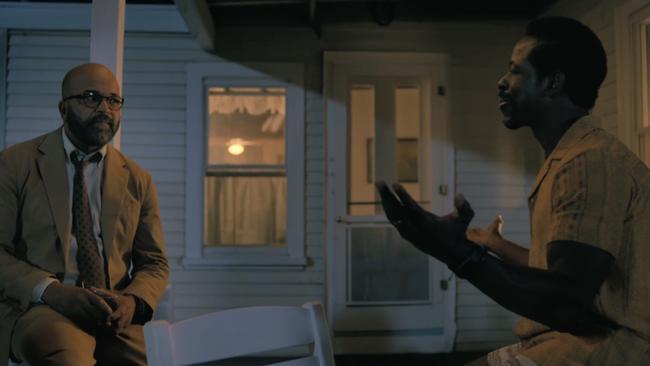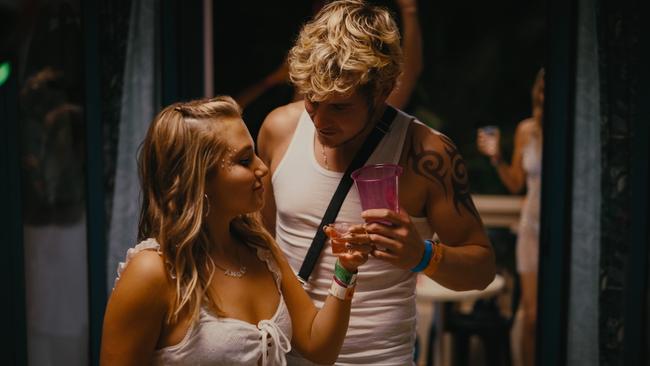American Fiction: This satire shouldn’t be laugh-out-loud funny ... but it is
A hilarious exchange with a student puts Monk on a path that sends up academia, writers, publishing, literary awards, Hollywood and much more. It is one of the funniest films I’ve seen in a while.

The satirical American drama American Fiction opens with university professor Thelonious Ellison teaching American literature. On the blackboard he has written The Artificial N...ger, the title of a short story by Flannery O’Connor.
He is African-American. One of his students, who is not, tells him the word is wrong. He looks at it and replies that as far as he knows the word still has two Gs. The student leaves the classroom.
This exchange puts Monk, as he is known in deference to the American jazz genius, on a path that sends up academia, writers, publishing, literary awards, Hollywood and much more. It is one of the funniest films I’ve seen in a while.
Jeffrey Wright, as Monk, has been nominated for best actor at the Academy Awards, which will be announced on March 11 Australian time, and deservedly so. The film has been nominated for best picture, also deservedly.
This is a satire so it shouldn’t be laugh-out-loud funny but it is. My 18-year-old co-viewer, who has just started university life, and I cackled a lot. It’s the best kind of satire: so close to the truth that, somewhere, sometime, it probably is true. It’s also a powerful account of a fractured family. Monk comes from a gene pool of doctors. He’s one, too, but it’s a PhD. This is an African American family that is not poor, not into rap, not dealing drugs, not being shot by police and not thinking about slavery.
Monk is also a critically successful novelist who sells no books. The reason, he thinks, is that he does not write about any of the above, from poverty to slavery. He does not write “black” books that cater to the booming market of “guilt-ridden whites”. “The blackest thing in this one,’’ he says of his latest one, “is the ink.”
The opening altercation with a student results in Monk being put on extended leave from the Los Angeles university at which he teaches.
He returns home to Boston, where his mother (Leslie Uggams) is in the early stages of dementia. His plastic surgeon brother, Clifford (Sterling K. Brown, Oscar nominated as best supporting actor), has come out as gay and is in a messy divorce.
“This family will break your heart,’’ Cliff says.
Monk, frustrated, decides he will write a “black” book. He uses the pseudonym Stagg R. Leigh (a convict from the American folk song that Nick Cave, naturally, turned into a darker rendition), writes My Pafology and sends it to his agent (John Ortiz).
The response is immediate and hugely lucrative. A publisher wants it and will pay $US750,000. Hollywood wants it and will pay five times that. It’s entered for a literary award for which Monk is one of the judges.
Monk needs the cash because of his mother, so he signs up, pretends to be a real outlaw on the run so his face cannot be shown in publicity interviews and so on. Asked in one interview if the novel is autobiographical, he replies, adopting what he assumes is a jailhouse voice, “You think some bitch-ass college boy can come up with that shit?” This film is full of outstanding set pieces, including when Monk sits down to write My Pafology. His characters appear in the room and start asking him questions. “Now,’’ he tells one of them, “some dumb melodramatic sob story about your broken interiority.”
Others include Monk and his agent’s telephone calls with the publisher, especially when Monk demands the novel be retitled F..k, and Monk’s dealings with the Hollywood producer (a hilarious Adam Brody).
American Fiction is the directorial debut of Cord Jefferson, who had a white mother and black father, which is relevant in a film about the search for identity. Jefferson’s television script work includes the brilliant comedy series The Good Place (2016-2020). His script for this film, also nominated for an Oscar, is based on the 2001 novel Erasure by the African-American writer Percival Everett.
He includes some good in-jokes, including one about his home town of Tucson, Arizona, and one about Russell Crowe. And I assume Monk’s surname, Ellison, is a reference to African-American writer Ralph Ellison and his best-known novel, Invisible Man. This film, which has received five Oscar nominations (the fifth is for Laura Karpman’s musical score), encapsulates what an outstanding cinematic year 2023 was.
Looking back, I think the nearest comparable year of best picture nominees is 2019: Parasite, which won, Ford v Ferrari, The Irishman, Jojo Rabbit, Joker, Little Women, Marriage Story, 1917 and Once Upon a Time in Hollywood.
In a lesser year, Wright would win best actor (and he still may do so, though I think it will go to Cillian Murphy for Oppenheimer). Either way, American Fiction is a remarkable, thought-provoking and, above all, humorous film.
American Fiction (MA15+)
117 minutes
Prime Video from February 27
★★★★
Summer rite of passage
I think I have some idea of the answer to the question posed in How to Have Sex, but I’m a middle-aged man, not a 16-year-old girl from England, as are the three main characters in this movie.
A friend who has a late-teen daughter saw the film and told me, “Welcome to my daughter’s life.’’ It’s an undistilled, excited, anxious existence centred on drinking, smoking, dressing right, partying, being one of the crowd and, above all, sex.
The lack of a titular question mark goes to the multiple strands of this film, which is the directorial debut of British cinematographer Molly Manning Walker.
For Tara (a compelling Mia McKenna Bruce) there are at least two question marks. She’s a virgin, as one of her “besties”, Skye (Lara Peake), regularly reminds her.

She needs to work out how to have sex – how to make it possible – and then decide when and how that sex should happen. Her sexual coming-of-age explores debated areas of consent.
Is saying “yes” enough when you are off your face on booze? If you say “yes” once should the person you say it to assume it’s a blanket invitation?
Tara, Skye and the third “bestie for eva”, Em (Enva Lewis), who is gay, have just finished their high school exams and are holidaying at Malia, a party town on the Greek island of Crete. It’s the seamy, sweaty, grimy English equivalent of schoolies.
On arrival at their motel, which has a penis-shaped swimming pool (which the filmmakers found in a real hotel in Malia), the ground rules are set.
“Whoever’s getting laid the most” can have the bedroom. Whoever gets the most sex overall will win a bottle of distasteful looking (to this middle-aged man) booze.
“If you don’t get laid on this holiday you never will,’’ Skye tells Tara. So the pressure is on. Skye is slightly cruel, and I have a theory as to why.
The girls soon hook up with three youths camped at the same hotel: Badger (Shaun Thomas), who has a lipstick kiss and the words hot legends tattooed on his neck, Paddy (Samuel Bottomley), who Badger warns is “a nightmare of a guy”, and Paige (Laura Ambler), who is gay.
They go out to loud, neon-lit clubs. They dance, drink, drink, drink and vomit. Sex is everywhere. It’s expected. At one club women are invited on to the stage to pleasure two men, one of whom is Badger. This, too, is drawn from the 30-year-old director’s own experiences.
The director’s background as a cinematographer (Scrapper from 2023), and the work of the actual cinematographer, Nicolas Canniccioni, brings this night and day world into stark relief.
In the daylight shots, when the partygoers are crashed out, often on the rim of a toilet, the town streets look like something out of the television series The Last of Us: post-apocalyptic, no humans in sight.
Badger’s warning about his lifelong mate is ignored, at least at first, because everyone agrees Paddy is “fit”. And it’s true that he’s good-looking, in a Barry Keoghan kind of way.
All six characters are important in this exploration of friendship and sexual beginnings, but Tara becomes the centre. She likes Badger, and he does seem sweet, but the need to fit in with what her friends think draws her to Paddy.
The result is physically and emotionally unsettling, perhaps traumatic. The director, who wrote the script, does not put the character’s inner thoughts into dialogue because they are too young, too immature to express them coherently.
This leaves it to the visible manifestation of such thoughts – the forced smiles, the doubt in the eye – and Mia McKenna Bruce and Shaun Thomas, as Tara and her should-be friend, possible-lover Badger, are impressive in showing this buried emotion.
There is no nostalgia in this rite of passage movie, as there often is in teen dramedies. For the generation in question, I imagine it feels close to a documentary.
The girls’ parents are on the other end of mainly ignored text messages. They are the ones who will tell them if their exam results are good or bad. Yet this becomes of less importance to what is happening in Malia. The director opens possibilities that would be any parent’s worst nightmare.
There is a lot to take out of this movie, which won the Un Certain Regard award at the 2023 Cannes Film Festival. One is whether friendships are true or false, forever or temporary. Will the three girls still be friends in a decade’s time? This film marks Molly Manning Walker as a director to watch.
How to Have Sex (MA15+)
89 minutes
In cinemas
Advance screenings this weekend ahead of national release on March 7
★★★½




To join the conversation, please log in. Don't have an account? Register
Join the conversation, you are commenting as Logout